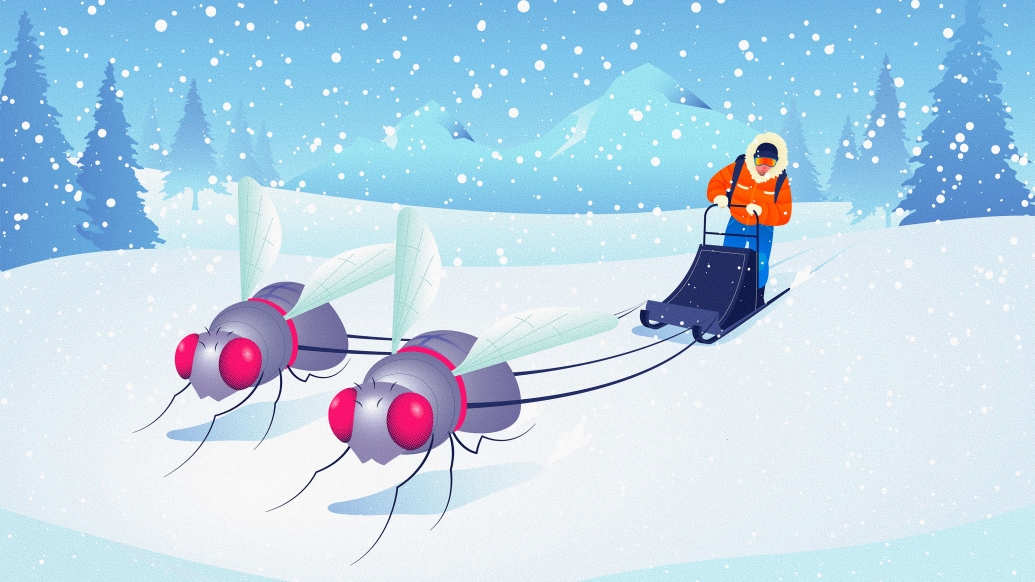The gene, dubbed Iditarod, seems responsible for exercise’s ability to clean up damaged cells
3:00 PM
Author |

As the days get shorter and chillier in the northern hemisphere, those who choose to work out in the mornings might find it harder to get up and running.
A study in PNAS identifies a protein that, when missing, makes exercising in the cold that much harder—that is, at least in fruit flies.
A team from University of Michigan Medical School and Wayne State University School of Medicine discovered the protein in flies, which they named Iditarod after the famous long distance dog sled across Alaska, while studying metabolism and the effect of stress on the body.
They were particularly interested in a physiological process called autophagy wherein damaged parts of cells are removed from the body. In screening the fly genome, they found a candidate for regulating the critical housekeeping procedure.
They demonstrated the link between autophagy and Iditarod, or Idit, by tweaking the genetic makeup of some flies to overactivate autophagy in their eyes.
Flies with too much autophagy had massive cell death leading to visible degeneration of the eye. Inactivating Idit gene restored the normal eye structure, indicating that Idit gene is involved in the autophagy process.
The team’s next step was to look for a similar gene, or homolog, in humans.
“When we queried this gene in the human genome, a gene called FNDC5, which is a precursor to the protein irisin, was the top hit,” said Jun Hee Lee, Ph.D., of the U-M Department of Molecular and Integrative Physiology.
Previous research has shown irisin to be an important hormone involved in producing musculoskeletal and other benefits of exercise in mammals, as well as playing a role in adaptation to cold temperatures.
Lee’s lab had an existing interest in exercise as a mild form of bodily stress.
“We realized this gene may be also important for exercise and if so, we should be able to detect a similar physiological effect in flies,” said Lee.
Working with Robert Wessells’ team at Wayne State University who developed a novel way to train fruit flies, the investigators used a sort of fly cliff climber that capitalizes on the insect’s instinct to climb upward out of a test tube.
They found that flies that were bred to lack the Idit gene had impaired exercise endurance, and lacked the improvement typically seen after training.
Furthermore, irisin in mammals is known to upregulate thermogenic processes, which is critical for cold resistance. Interestingly, flies without Idit were also unable to tolerate cold.
What this tells us, says Lee, is this gene family, present in invertebrates as well as mammals appears to have been conserved throughout evolution and serves an important function.
“We believe that exercise helps clean the cellular environment through autophagy,” said Lee. “When you are exercising hard, there is damage to the muscle and some of the mitochondria will malfunction,” said Lee.
“The autophagy process becomes activated to clean up any damaged organelles or toxic byproducts, and Idit gene seems important in this process.”
Lee hopes to next connect this work to their previous work on exercise and physiological stress.
Paper cited: “Iditarod, a Drosophila homolog of the Irisin precursor FNDC5, is critical for exercise 2 performance and cardiac autophagy,” PNAS. DOI: 10.1073/pnas.2220556120

Explore a variety of health care news & stories by visiting the Health Lab home page for more articles.

Department of Communication at Michigan Medicine
Want top health & research news weekly? Sign up for Health Lab’s newsletters today!





